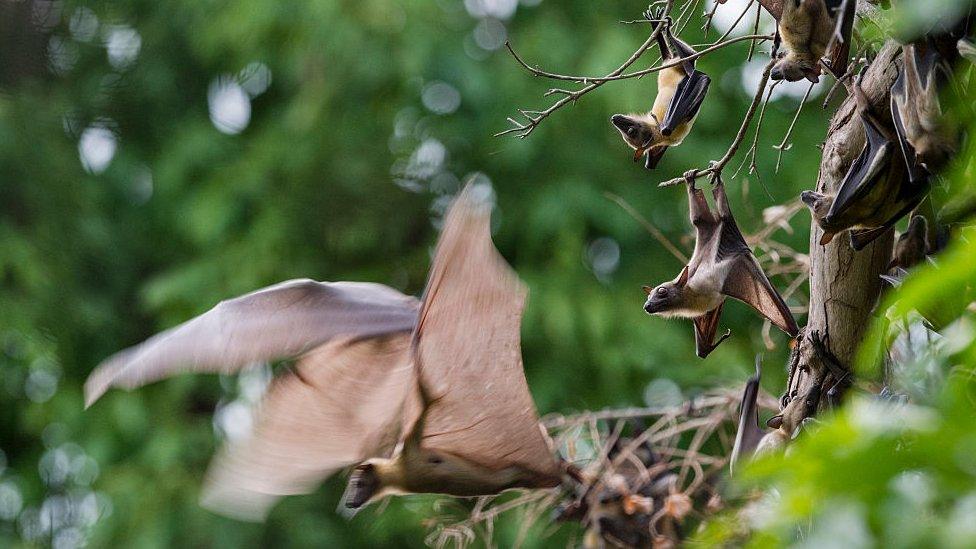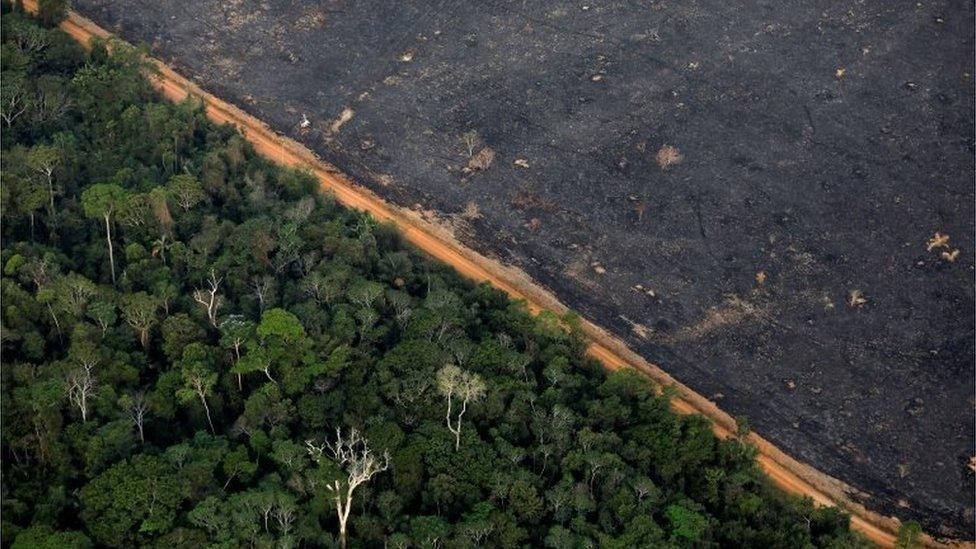Cheaper to prevent pandemics than 'cure' them
- Published

The world needs a new approach to prevent future pandemics killing millions more victims, a report says.
It says contact between people, wildlife and livestock must be curbed to cut the risk of bacteria and viruses crossing from animals to humans.
Health care should be provided for people living close to animals in high-risk areas.
This would help stop outbreaks of disease before they have a chance to spread more widely.
Common approaches are needed, it says, so that pandemic prevention becomes commonplace around the world.
It would be hundreds of times cheaper to prevent outbreaks than to suffer the grim consequences, the authors maintain.
It calls on people to stop encroaching on wild land and eat less meat, because the industry drives contact between humans and emerging pathogens.
The report says governments must work together to avoid future pandemics, and must swiftly contain outbreaks.
It warns that, without a co-ordinated global plan, more will die from future pandemics more dangerous than Covid-19.
The document has been drawn up by an organisation established by the UN, which is known as IPBES (Intergovernmental Science-Policy Platform on Biodiversity and Ecosystem Services). It is tasked with protecting the natural world on behalf of people.
It notes that the current pandemic might cost the world economy $16 trillion (£12.2 trillion) by next summer.
But preventive measures - such as cracking down on the wildlife trade - would cost between $22bn and $31bn annually. It's a large sum, but a fraction of the economic cost of coping with a pandemic like Covid-19.
What is biodiversity? Laura Foster explains
The authors say the risk of pandemics is increasing rapidly, with more than five new diseases emerging every year.
The report warns that 70% of new diseases like ebola and zika, and almost all known pathogens with pandemic potential, such as influenza, HIV, and the novel coronavirus, have their origins in animals.
These diseases “spill over“ - jump from one species to another - during contact between wildlife, livestock, and people.
The report says mammals and birds are estimated to harbour more than a million undiscovered viruses.

A number of human diseases come from bats, but experts say they should not be blamed
It recommends:
setting up an expert pandemic prevention panel like the world’s climate change panel;
an international accord to build preparedness, enhance prevention, and control outbreaks;
a common approach on assessing major land-use projects that might expose humans to animal viruses.
The document says: “Pandemics are becoming more frequent. Without preventive strategies, they will emerge more often, spread more rapidly, kill more people, and affect the global economy with more devastating impact.”
It criticises current strategies which rely on responding to diseases with new vaccines after they’ve emerged.
The authors say: “Covid-19 demonstrates this is a slow and uncertain path, as the human costs are mounting in lives lost, sickness endured, economic collapse, and lost livelihoods.”
The authors trace the drivers of pandemics, including agricultural expansion and intensification, the wildlife trade, wildlife consumption and global travel.
The recommendation to lower the consumption of farmed and wild meat – especially from emerging disease hotspots - may face resistance from nations such as Brazil.
Ranching and the production of animal feed contribute significantly to the South American country's economy.

Habitat destruction is hastening spillovers of diseases from animals to humans
But other reports have noted that eating less meat would also protect wildlife, enhance human health and combat climate change.
The authors say climate heating is implicated in disease emergence, mentioning tick-borne encephalitis.
They say it's likely to increase the future risk from disease by driving the movement of people, wildlife, and pathogens in ways that lead to new contact among species.
Prof Matthew Baylis from Liverpool University, who was not involved with the new report, told BBC News: “Slowing the degradation of natural land will be as challenging to politicians and the public as preventing climate change.
“But the huge human, social and economic costs of the Covid-19 pandemic make a compelling case for global action. A major bonus is that this action can also contribute to addressing climate change (by preserving natural land)."
Questions will doubtless be raised about some of the numbers in the report.


THREE TIERS: How will the system work?
SOCIAL DISTANCING: Can I give my friends a hug?
LOOK-UP TOOL: How many cases in your area?

The lead author, Peter Daszak, told BBC News that all the calculations were based on published scientific papers.
He said: “Of course it’s tough to predict the unknown and the real numbers could be higher or lower. But it’s very, very clear that the costs of prevention are orders of magnitude lower than the costs of a major pandemic.”
Prof Kate Jones from University College London (UCL), who didn’t work on the document, said: “It’s a bit speculative about the costs, clearly.
“But it seems roughly right, especially given how much this current pandemic is costing - and this one is pretty mild, given the range of possibilities of these types of diseases.”
However compelling the numbers may be, decisions on pandemics will be determined by global politics.
Lee Hannah, from the green group Conservation International, told BBC News: "The challenge isn't what to do, we know what to do - reduce deforestation and re-establish healthy relationships between people and forests.
"The question is whether there is the political will to invest $10bn or more each year globally, and then sustain that investment to avoid trillions of dollars in damages and untold tolls in loss of life and disruption."
Follow Roger on Twitter., external